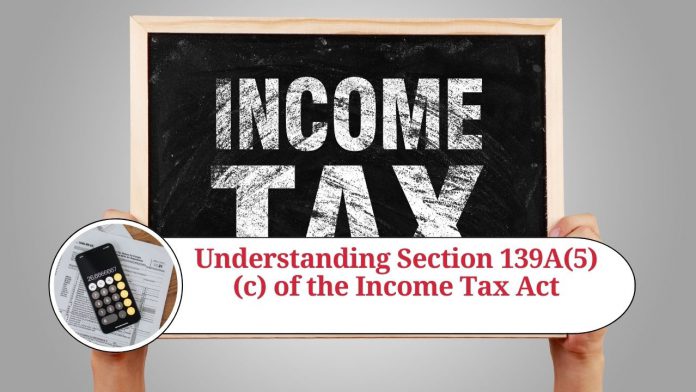Section 139A(5)(c) of the Income Tax Act is an essential provision that mandates every person who is required to apply for a Permanent Account Number (PAN) to furnish his or her Aadhaar number to the tax authorities. In this blog, we will discuss this provision in detail and understand its implications.
What is Section 139A(5)(c) of the Income Tax Act?
Section 139A(5)(c) of the Income Tax Act, 1961, was introduced by the Finance Act, 2017, and it requires every person who is required to apply for a PAN under Section 139A(1) of the Act to furnish his or her Aadhaar number. The section reads as follows:
“Every person who has been allotted permanent account number as on the 1st day of July, 2017, and who is eligible to obtain Aadhaar number, shall intimate his Aadhaar number to such authority in such form and manner as may be prescribed, on or before a date to be notified by the Central Government in the Official Gazette: Provided that in case of failure to intimate the Aadhaar number, the permanent account number allotted to the person shall be deemed to be invalid and the other provisions of this Act shall apply, as if the person had not applied for allotment of permanent account number.”
The provision requires individuals to link their Aadhaar number with their PAN and makes it mandatory for them to provide their Aadhaar number while applying for PAN or while filing their tax returns.
Implications of Section 139A(5)(c)
The purpose of Section 139A(5)(c) is to bring greater transparency and accountability to the tax system by ensuring that every individual’s PAN is linked with his or her Aadhaar number. This linkage helps in identifying duplicate PANs and curbing tax evasion. Here are some implications of Section 139A(5)(c):
- Invalid PAN: In case an individual fails to furnish his or her Aadhaar number while applying for PAN or filing tax returns, his or her PAN will be deemed invalid, and the other provisions of the Income Tax Act will apply as if the person had not applied for the allotment of PAN. This provision helps in weeding out duplicate PANs and streamlining the tax system.
- Linkage with Aadhaar: The provision mandates that every individual’s PAN is linked with his or her Aadhaar number, which helps in curbing tax evasion and identifying fraudulent activities.
- Compliance: The provision ensures that individuals comply with the requirement of linking their Aadhaar number with their PAN and filing tax returns. Failure to comply with this provision may attract penalties and legal action.
Conclusion
Section 139A(5)(c) of the Income Tax Act is an important provision that requires individuals to link their PAN with their Aadhaar number. The provision brings greater transparency and accountability to the tax system and helps in identifying duplicate PANs and curbing tax evasion. It is essential that individuals comply with this provision and furnish their Aadhaar number while applying for PAN or filing tax returns.
Read more useful content:
- section 234e of income tax act
- section 286 of income tax act
- section 90a of income tax act
- section 40a(7) of income tax act
- section 226(3) of income tax act
- section 24 of income tax act
Frequently Asked Questions (FAQs)
Q1. What is Section 139A(5)(c) of the Income Tax Act?
A1. Section 139A(5)(c) of the Income Tax Act mandates every person who is required to apply for a Permanent Account Number (PAN) to furnish his or her Aadhaar number to the tax authorities.
Q2. Who is required to comply with Section 139A(5)(c)?
A2. Every person who is required to apply for a PAN under Section 139A(1) of the Act is required to comply with Section 139A(5)(c) and furnish his or her Aadhaar number.
Q3. What happens if an individual fails to furnish his or her Aadhaar number?
A3. In case of failure to intimate the Aadhaar number, the permanent account number allotted to the person shall be deemed to be invalid, and the other provisions of the Income Tax Act shall apply, as if the person had not applied for allotment of PAN.
Q4. Can an individual apply for PAN without an Aadhaar number?
A4. No, an individual is required to furnish his or her Aadhaar number while applying for PAN.
Q5. Is it mandatory to link Aadhaar with PAN for filing income tax returns?
A5. Yes, it is mandatory to link Aadhaar with PAN for filing income tax returns.
Q6. What is the purpose of linking Aadhaar with PAN?
A6. Linking Aadhaar with PAN helps in identifying duplicate PANs and curbing tax evasion.
Q7. Can an individual have multiple PANs?
A7. No, an individual is not allowed to have multiple PANs. The provision of linking Aadhaar with PAN helps in identifying duplicate PANs.
Q8. What is the penalty for non-compliance with Section 139A(5)(c)?
A8. Non-compliance with Section 139A(5)(c) may attract penalties and legal action.
Q9. Can an individual update his or her Aadhaar details linked with PAN?
A9. Yes, an individual can update his or her Aadhaar details linked with PAN by visiting the Aadhaar Self Service Update Portal or by visiting the nearest Aadhaar Seva Kendra.
Q10. Is there any exemption from linking Aadhaar with PAN?
A10. Yes, exemptions are provided in certain cases such as for individuals who are not eligible to obtain Aadhaar number or for non-residents who do not have Aadhaar number.




















